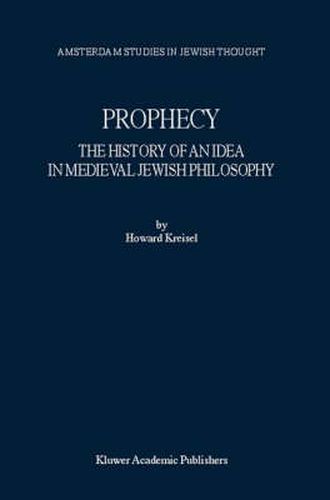Readings Newsletter
Become a Readings Member to make your shopping experience even easier.
Sign in or sign up for free!
You’re not far away from qualifying for FREE standard shipping within Australia
You’ve qualified for FREE standard shipping within Australia
The cart is loading…






This title is printed to order. This book may have been self-published. If so, we cannot guarantee the quality of the content. In the main most books will have gone through the editing process however some may not. We therefore suggest that you be aware of this before ordering this book. If in doubt check either the author or publisher’s details as we are unable to accept any returns unless they are faulty. Please contact us if you have any questions.
Prophecy, more than any other phenomenon, represents the point at which the Divine meets the human, the Absolute meets the relative. How can a human being attain the Word of God? In what manner does God, when conceived as eternal and transcendent, address corporeal, transitory creatures? What happens to God’s divine Truth when it is beheld by minds limited in their power to apprehend, and influenced by the intellectual currents of their time and place? How were these issues viewed by the great Jewish philosophers of the past, who took the divine communication and all it entails seriously, while at the same time desiring to understand it as much as humanly possible in the course of dealing with a myriad of other issues that occupied their attention? This book offers a profound study of prophesy in the thought of seven mediaeval Jewish philosophers: R. Saadiah Gaon, R. Judah Halevi, Maimonides, Gersonides, R. Hasadi Crescas, R. Joseph Albo, and Baruch Spinoza. It attempts to recapture the ‘original voice’ of these thinkers, looking at the intellectual milieus in which they developed their philosophies and by carefully analysing their views in their textual contexts. It also deals with the relation between the earlier and later approaches. A significant model for narrating the history of an idea.
$9.00 standard shipping within Australia
FREE standard shipping within Australia for orders over $100.00
Express & International shipping calculated at checkout
This title is printed to order. This book may have been self-published. If so, we cannot guarantee the quality of the content. In the main most books will have gone through the editing process however some may not. We therefore suggest that you be aware of this before ordering this book. If in doubt check either the author or publisher’s details as we are unable to accept any returns unless they are faulty. Please contact us if you have any questions.
Prophecy, more than any other phenomenon, represents the point at which the Divine meets the human, the Absolute meets the relative. How can a human being attain the Word of God? In what manner does God, when conceived as eternal and transcendent, address corporeal, transitory creatures? What happens to God’s divine Truth when it is beheld by minds limited in their power to apprehend, and influenced by the intellectual currents of their time and place? How were these issues viewed by the great Jewish philosophers of the past, who took the divine communication and all it entails seriously, while at the same time desiring to understand it as much as humanly possible in the course of dealing with a myriad of other issues that occupied their attention? This book offers a profound study of prophesy in the thought of seven mediaeval Jewish philosophers: R. Saadiah Gaon, R. Judah Halevi, Maimonides, Gersonides, R. Hasadi Crescas, R. Joseph Albo, and Baruch Spinoza. It attempts to recapture the ‘original voice’ of these thinkers, looking at the intellectual milieus in which they developed their philosophies and by carefully analysing their views in their textual contexts. It also deals with the relation between the earlier and later approaches. A significant model for narrating the history of an idea.